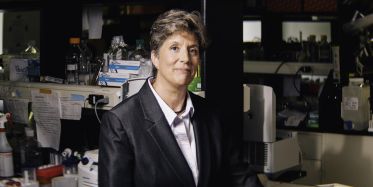Noam Auslander, Ph.D.
-
Assistant Professor, Molecular and Cellular Oncogenesis Program, Ellen and Ronald Caplan Cancer Center
Auslander focuses on developing machine learning methods to understand genetic and infectious factors that drive cancer development and identify patterns that can improve cancer diagnosis and treatment.
Auslander earned her B.S. in computer science and biology from Tel Aviv University and continued her studies in Maryland, where she obtained a computer science Ph.D. from the University of Maryland with a combined fellowship at the National Cancer Institute. She received postdoctoral training at the National Center of Biotechnology Information (NCBI) and joined The Wistar Institute in 2021 as an assistant professor.
The Auslander Lab

The Auslander Lab
In the past years, enormous growth in the quantity of biomedical data has been paralleled by advances in computational and deep learning techniques. These rapidly accumulating biomedical and clinical datasets have the potential to uncover unknown genetic drivers of cancer, carcinogenic infectious agents, and new treatment biomarkers. To achieve this potential, there is a need for improved and more interpretable computational strategies that can handle different types of biomedical data.
The Auslander laboratory develops advanced machine and deep learning methods to identify factors that drive cancer development and predict patients’ prognoses. We focus on the development of deep learning methods to identify new infectious agents in cancer, and the development of machine learning strategies that improve outcome prediction through biologically interpretable classifiers.
-
Postdoctoral Fellow
Abdurrahman Elbasir
-
Graduate Students
Anastasia Lucas (Rotation student, UPenn-GCB)
Andrew Patterson (UPenn-GCB)
Konstantinos Tsingas (MS student, UPenn-Biostatistics) -
Undergraduate Student (Computational Biology BS, CMU)
Daniel Schaffer
Postdoctoral fellow positions are available in the Auslander laboratory with a research focus on developing machine learning metagenomics and microbiome computational methods to study the role of microbes in cancer.
Candidates should have recently received or be close to obtaining their Ph.D. degree (or equivalent) and have a strong background in one or more of the following disciplines: computer science, data science and machine learning, or bioinformatics and computational biology.
Interested applicants are invited to email nauslander@wistar.org
Research
Characterization of the Cancer Microbiome with Machine Learning
While the burden of cancer caused by infections is high, the attributable fraction is believed to be highly under-estimated by much of the cancer community. Identification of new cancer microbes has the potential to significantly reduce the global impact of cancer. However, identification of viruses or bacteria in tumors is highly challenging based short sequencing reads.
To address this challenge, our lab develops machine learning-based sequence analysis frameworks to better characterize the landscape of microbes that underlie different cancer types and correlate cancer-associated microbial species and proteins with prognoses and treatment responses.
-
Postdoctoral Fellow
Abdurrahman Elbasir
-
Graduate Students
Anastasia Lucas (Rotation student, UPenn-GCB)
Andrew Patterson (UPenn-GCB)
Konstantinos Tsingas (MS student, UPenn-Biostatistics) -
Undergraduate Student (Computational Biology BS, CMU)
Daniel Schaffer
Postdoctoral fellow positions are available in the Auslander laboratory with a research focus on developing machine learning metagenomics and microbiome computational methods to study the role of microbes in cancer.
Candidates should have recently received or be close to obtaining their Ph.D. degree (or equivalent) and have a strong background in one or more of the following disciplines: computer science, data science and machine learning, or bioinformatics and computational biology.
Interested applicants are invited to email nauslander@wistar.org
Biologically Informed Classifiers of Cancer Treatment Responses
A major difficulty limiting the translational potential of machine learning methods is low biological interpretability. More complex models often lead to better performance, but these are typically less interpretable and therefore less likely to contribute to biological or clinical cancer research.
Our lab develops methods to construct biologically motivated classifiers of cancer treatment responses and prognoses by incorporating biological knowledge and databases with cancer genomics.
Auslander Lab in the News
Selected Publications
A Deep Learning Approach Reveals Unexplored Landscape of Viral Expression in Cancer.
Elbasir, A., Ye, Y., Schäffer, D.E., Hao, X., Wickramasinghe, J., Tsingas, K., Lieberman, P.M., Long, Q., Morris, Q., Zhang, R., et al. “A Deep Learning Approach Reveals Unexplored Landscape of Viral Expression in Cancer.” Nat Commun. 2023 Feb 11;14(1):785. doi: 10.1038/s41467-023-36336-z.
Mutated Processes Predict Immune Checkpoint Inhibitor Therapy Benefit in Metastatic Melanoma.
Patterson A., Auslander N. “Mutated Processes Predict Immune Checkpoint Inhibitor Therapy Benefit in Metastatic Melanoma.” Nat Commun. 2022 Sep 19;13(1):5151. doi: 10.1038/s41467-022-32838-4.
In silico learning of tumor evolution through mutational time series.
Auslander, N., Wolf, Y.I., Koonin, E.V. “In silico learning of tumor evolution through mutational time series.” Proc Natl Acad Sci U S A. 2019 May 7;116(19):9501-9510. doi: 10.1073/pnas.1901695116.
Seeker: alignment-free identification of bacteriophage genomes by deep learning.
Auslander, N., Gussow, A.B., Benler, S., Wolf, Y.I., Koonin, E.V. “Seeker: alignment-free identification of bacteriophage genomes by deep learning.” Nucleic Acids Res. 2020 Dec 2;48(21):e121. doi: 10.1093/nar/gkaa856.
Robust prediction of response to immune checkpoint blockade therapy in metastatic melanoma.
Auslander, N., Zhang, G., Lee, J.S., Frederick, D.T., Miao, B., Moll, T., Tian, T., Wei, Z., Madan, S., Sullivan, R.J., et al. “Robust prediction of response to immune checkpoint blockade therapy in metastatic melanoma.” Nat Med. 2018 Oct;24(10):1545-1549. doi: 10.1038/s41591-018-0157-9. Epub 2018 Aug 20.


